Dit verhaal maakt deel uit van Next Generation, een serie waarin we jonge makers een platform bieden om hun werk te presenteren. Jouw werk hier? Neem contact op en bepaal je coördinaten terwijl we samen onze toekomst verkennen.
Deze serie wordt geopend door Valerie Daude, een recente afgestudeerde van de master Social Design aan de Design Academy Eindhoven (DAE). Zij is geïnteresseerd in hoe darmbacteriën een cruciale rol spelen bij het in stand houden van onze menselijke gezondheid op vele vlakken, en streeft ernaar te begrijpen hoe biologische organismen interactie hebben met hun menselijke gastheer.
Dit onderzoek heeft haar ertoe gebracht het Microbial Self-project te ontwerpen, een reeks interactieve gezichtsprotheses die de diversiteit van microbiële soorten in onze darmen meten en visualiseren, en zo inzicht geven in onze lichamelijke en geestelijke gezondheidstoestand.
Volgens de ontwerper, "de maskers fungeren als lichaamsverlengstukken die een dialoog mogelijk maken tussen ons en de micro-organismen binnen in ons. Je 'binnenkant' tonen midden in je gezicht, je identiteit verbergen en deze delen met je micro-organismen."
Welkom bij de Nieuwe Generatie: Maak kennis met Valerie Daude.
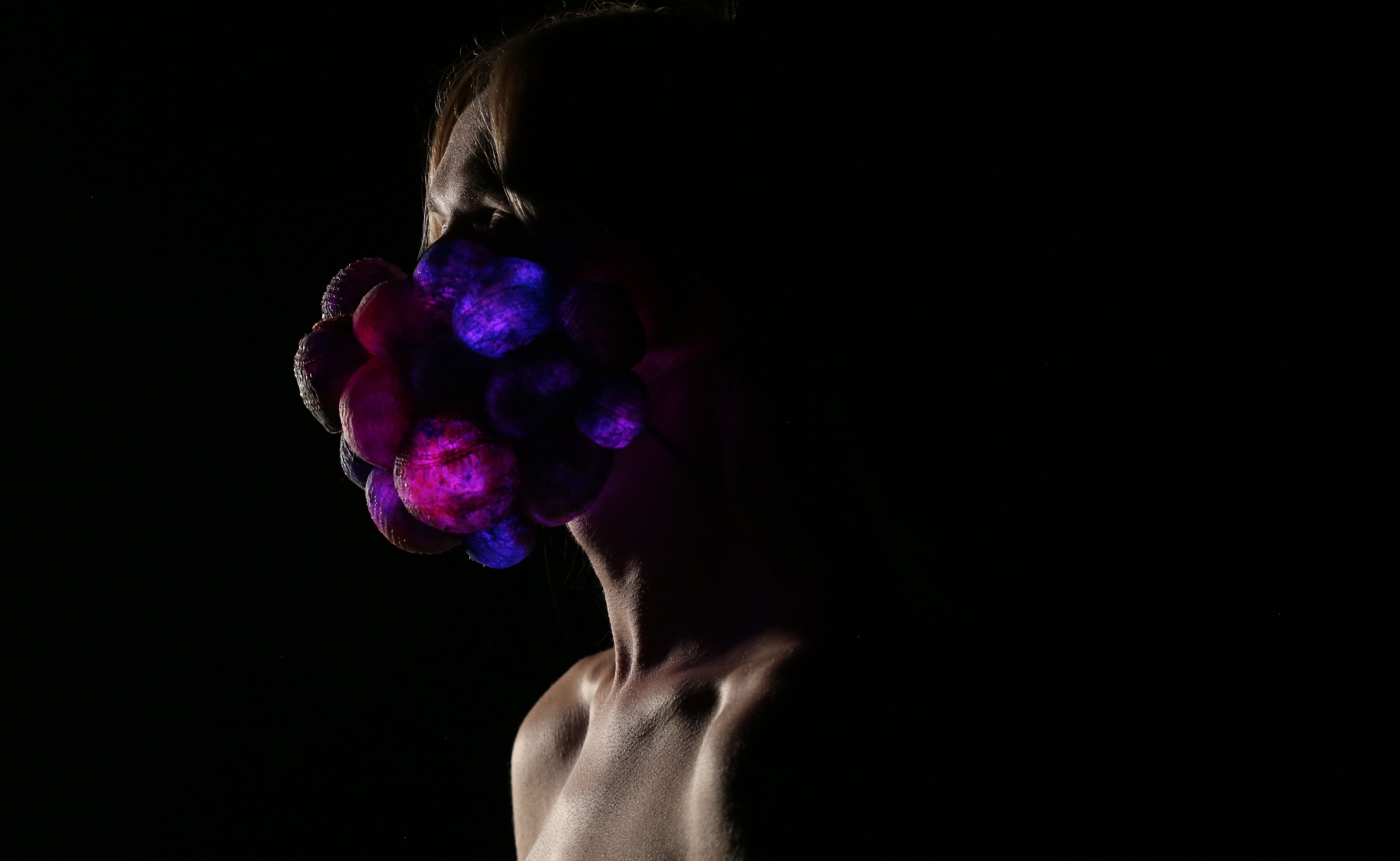
Waar komt jouw fascinatie voor microbieel ontwerp vandaan?
Als vrouw van 1,92 meter beschouwen standaardorganisaties zoals ISO of DIN mijn lengte als niet-standaard. Daardoor past de wereld die is gebouwd niet bij mijn lichaamsgrootte en laat die mij dagelijks de negatieve kanten van industriestandaarden ervaren.
Dit motiveerde mij om onderzoek te doen naar ergonomische theorie, het proces van normalisatie en standaardisatie van het menselijk lichaam, en vooral historische concepten van het normale of gemiddelde.
Ik ontdekte dat de eerste fysieke meeteenheid het menselijk lichaam zelf was. De resulterende antropische eenheden gingen verder dan het focussen op het lichaam en werden gebruikt om de dimensies van de wereld te definiëren.
Hoe heeft deze inzicht je werk beïnvloed?
Terwijl ik probeerde alternatieve eenheden te definiëren om het menselijk lichaam te meten, leerde ik dat onze fysieke en mentale gezondheid sterk wordt beïnvloed door biljoenen micro-organismen die in, op en rondom ons leven.
De verschillen tussen lichamen op microscopisch niveau hebben een veel grotere impact op het algehele welzijn van mensen, meer dan verschillen in grootte en afmeting. Dit inzicht zorgde ervoor dat ik mijn focus verlegde van het definiëren van een lichaam aan de hand van antropometrische metingen naar het interpreteren van het lichaam in een veel kleinere en veel diversere eenheid — ik begon de micro-organismen in het lichaam te onderzoeken.
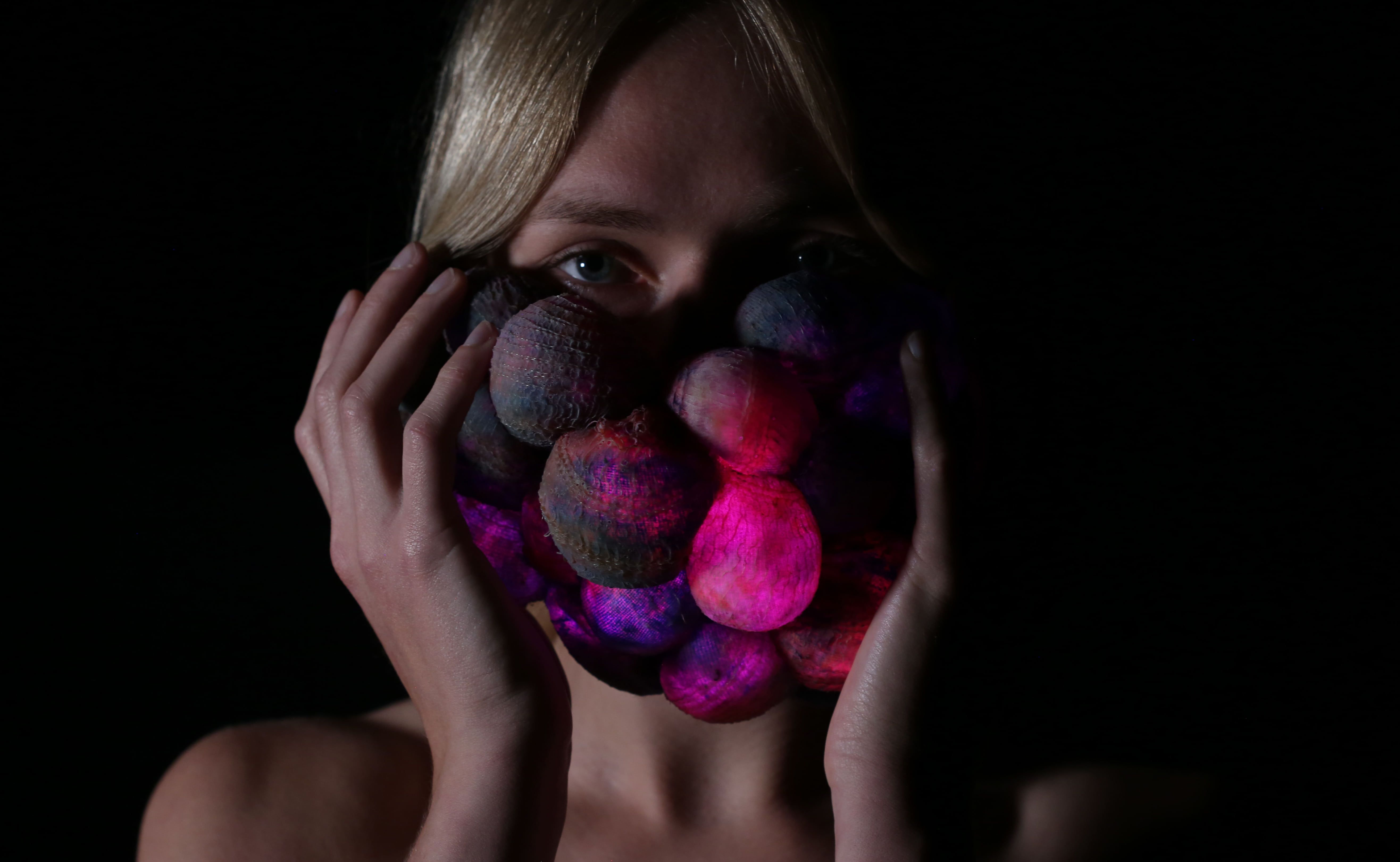
Vertel ons wat meer over deze micro-organismen.
Slechts 43% van het totale aantal cellen in een menselijk lichaam is menselijk. De overige 57% zijn micro-organismen, zoals bacteriën, virussen en schimmels. Hun populatie en genetisch materiaal worden het menselijk microbioom genoemd.
Bacteriën overtreffen andere microben in aantal, en de meeste soorten worden gevonden in de darm. Hun diversiteit is essentieel voor veel aspecten van ons lichamelijk en geestelijk welzijn. Tussen de 400 en tot wel 1000 verschillende bacteriesoorten leven in een gezonde darm. Hoe meer verschillende soorten je hebt, hoe beter het is voor je lichaam.
Ze helpen ons bij het verteren van bepaalde voedingsmiddelen, het aanmaken van vitamines, het in balans houden van ons immuunsysteem, en via de darm-hersen-as beïnvloeden ze onze cognitieve functies, stemming en zelfs ons gedrag.
Elk menselijk lichaam heeft zijn eigen unieke set microben die gedurende een leven voortdurend veranderen. Voeding, beweging, hygiëne, medicatie en vele andere invloeden uit onze omgeving bepalen de samenstelling van onze microben.
We beïnvloeden voortdurend onze microbiële lichamen zonder ons bewust te zijn van de impact op ons fysieke en mentale welzijn.
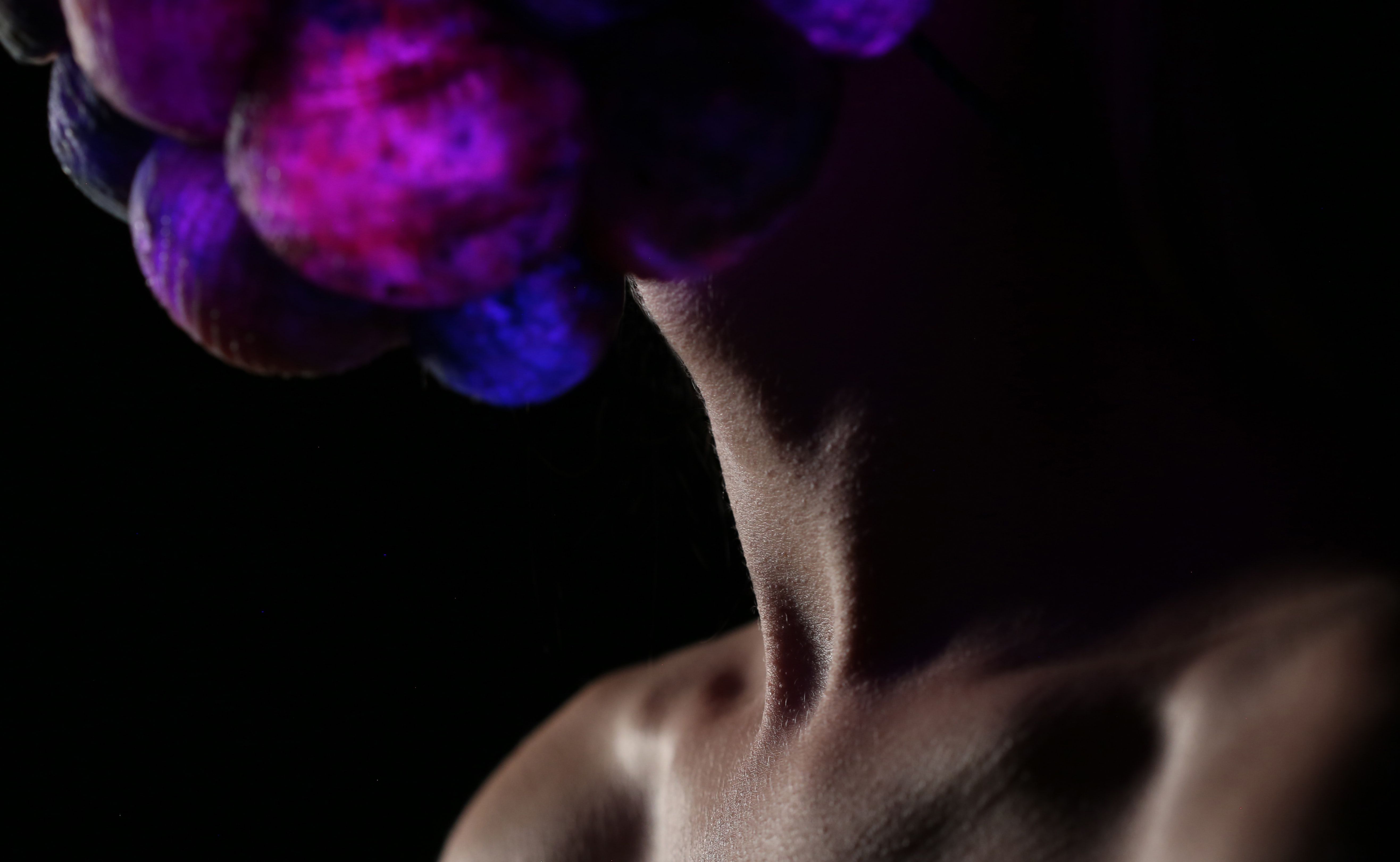
En jouw project heeft als doel dit te visualiseren?
Ja, ik werk aan methoden om de diversiteit van onze darmbacteriën te meten, visualiseren en weergeven. Daarom heb ik het concept van Microbial Masks ontwikkeld, die een geïntegreerde ademtest hebben die de diversiteit van darmbacteriën analyseert via chemicaliën in je adem.
Bij elke ademhaling vertaalt het masker de resultaten in een leesbare kleurcode die op het masker wordt weergegeven.
Voor wie zijn de maskers?
Allereerst en vooral is het een doorlopend ontwerponderzoeksproject. In dit stadium streeft het project ernaar om door middel van speculatie te onderzoeken hoe relaties tussen mensen, evenals tussen mensen en microben, beïnvloed zullen worden door vooruitgang in microbiome-onderzoek.
Tot op heden is de relatie tussen mensen en micro-organismen grotendeels bevooroordeeld geweest. Micro-organismen, vooral bacteriën, worden voornamelijk geassocieerd met ziekten, besmetting en dood.
Veranderingen in de huidige samenleving, zoals diëten met verhoogde hoeveelheden suiker, zout en verzadigd vet, onvoldoende lichaamsbeweging, overmatig gebruik van antibiotica, desinfectiemiddelen en bestrijdingsmiddelen veroorzaken een microbiële disbalans in onze omgevingen en ons lichaam.
Dit draagt bij aan een toename van obesitas, auto-immuunziekten, ontstekingsziekten, depressie en psychische gezondheidsproblemen. We hebben een paradigmaverschuiving nodig, van het beschouwen van microben als vijanden die geëlimineerd en vernietigd moeten worden, naar het streven naar een gezonde microbiotische omgeving binnen en rondom ons.
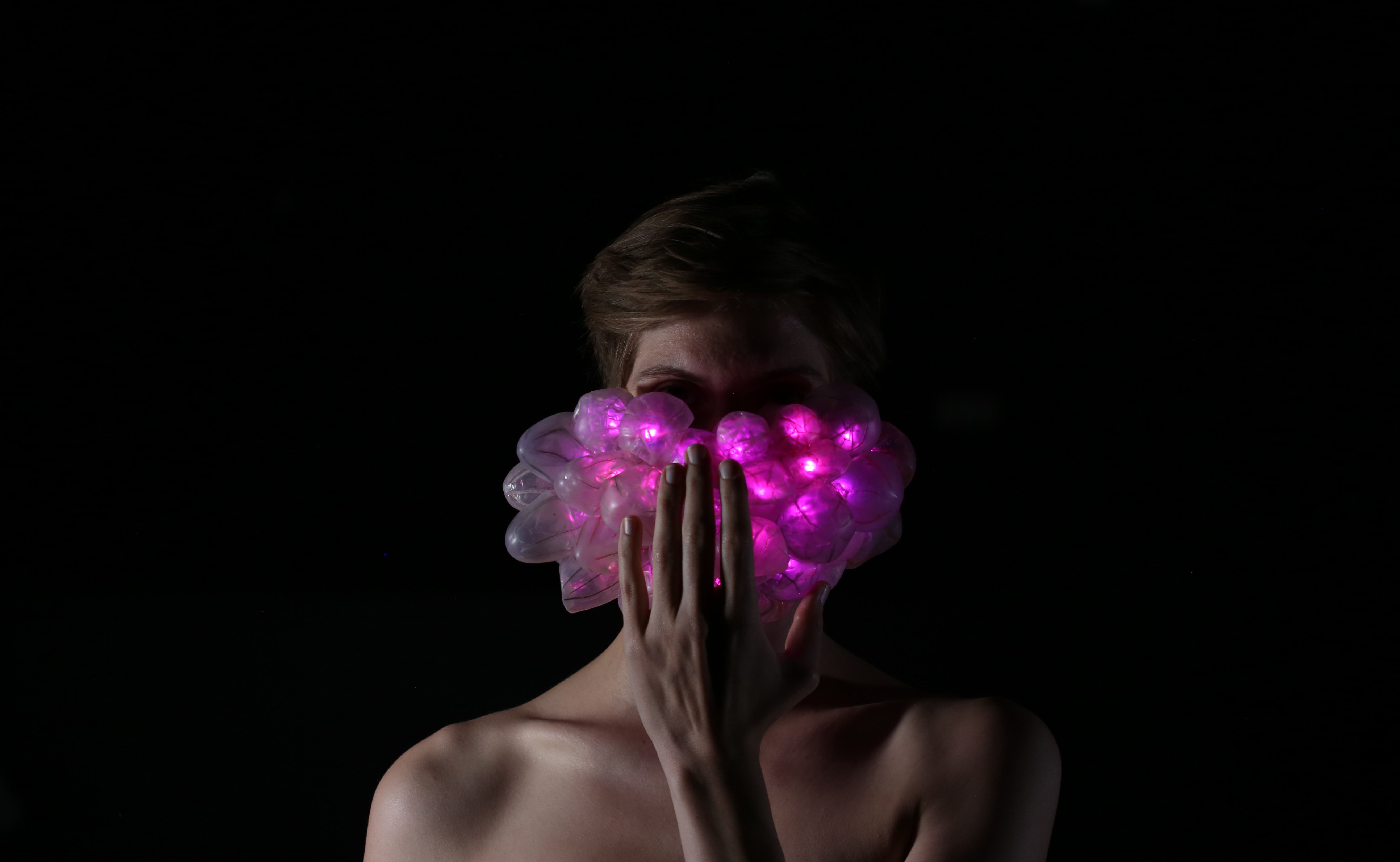
Waar konden de maskers voor het eerst geïntroduceerd worden gezien?
In een later stadium van het project zou de ademtesttechnologie kunnen worden geïmplementeerd in draagbare gezondheidszorgapparaten.
Tegenwoordig hebben patiënten weinig invloed in de meeste gezondheidszorgsystemen en zijn ze afhankelijk van de beslissingen van zorgverleners. Door middel van zelfmeetapparaten kunnen individuen betrokken raken bij het beheren van hun microbiële balans in de darmen en daarmee hun algehele gezondheid.
Zou je dit zelf dragen?
Ik zou de Microbial Masks dragen en presenteren op publieke evenementen, symposia of tentoonstellingen en anderen uitnodigen om ze te testen. Het belangrijkste doel ervan is om gesprekken te openen over de toekomstige toepassing van microbiome-onderzoek, gegevensbeveiliging, en om de relatie tussen mensen en micro-organismen uit te dagen.
Deze fase van het project gaat niet over het introduceren van het ontwerp of de technologie op de markt. Het doel is veeleer om mensen te verzamelen rond deze speculatieve objecten als een manier om interdisciplinair debat in stand te houden en nieuwe perspectieven op wetenschappelijk onderzoek te creëren.
De Microbial Masks zijn fysieke, tastbare en vorminteractieve gespreksstukken die de zintuigen en verbeelding uitdagen, waardoor de uitwisseling van inzichten tussen verschillende beroepen wordt gestimuleerd, van kunstenaars tot wetenschappers, om van elkaars perspectieven te leren.
Op een schaal van 1-10, hoe speculatief is het project?
Ik zie dit project als een nabije-toekomstscenario waarin de gezondheidszorg veel persoonlijker, politieker en expressiever wordt. Over het algemeen zou ik het een 7 geven.
Er zijn enkele onderdelen, zoals de ademtest, die nog steeds een concept zijn. Maar er zijn al diagnostische hulpmiddelen, zoals de waterstofademtest, die bacteriële groei in je spijsverteringskanaal kunnen meten via chemicaliën in je adem.
Ook kan de toepassing van deze technologie in een mondmasker niet worden uitgesloten. In China is het al heel gebruikelijk om in het openbaar mondmaskers te dragen om gezondheidsredenen. Hoewel het veel waarschijnlijker is dat velen er de voorkeur aan zouden geven om de informatie die door het Microbial Mask wordt verzameld privé te houden.
Afgezien daarvan is het potentieel van microbiome-onderzoek in de gezondheidszorg reëel. Steeds meer thuis-testkits voor darmbacteriën verschijnen op de markt. Ze beweren allemaal te helpen de gezondheid te verbeteren.
Hoewel de tests twijfelachtig zijn, wat betreft hun betrouwbaarheid, groeit de markt snel. Ik heb deze uiterst onpersoonlijke en vrij trage procedure omgevormd tot een meer zintuiglijke en snellere methode: een ademtest.
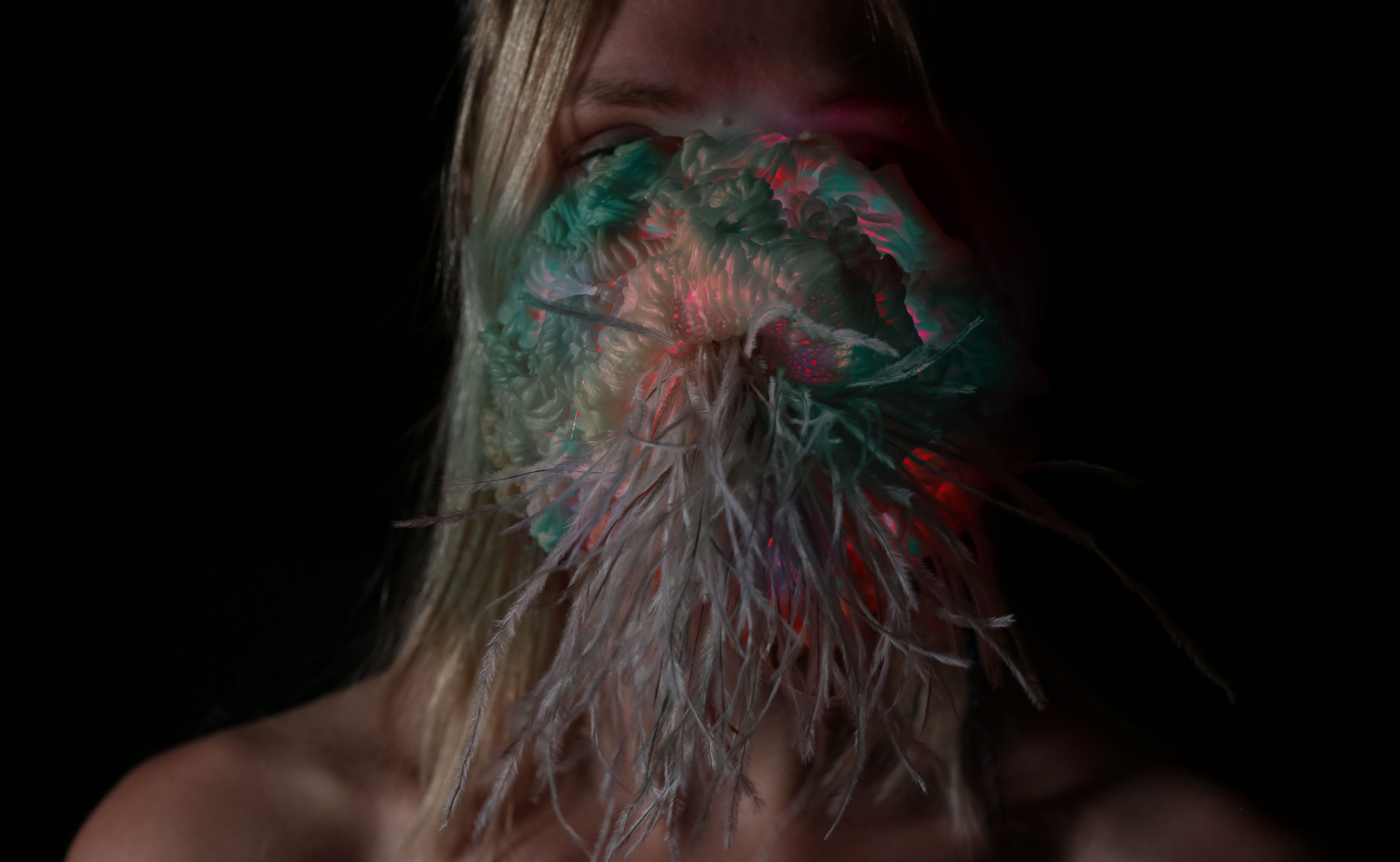
Het microbioom heeft het vermogen om ons lichaam, onze identiteit en onze gezondheid te beïnvloeden. Maskers terzijde gelaten, zou men kunnen beweren dat het ontwerpen van je microbioom een vorm van biohacking is, ben je het daarmee eens? Waarom?
Ja, absoluut. Biohacking hoeft niet gerelateerd te zijn aan microdosering, LSD of het implanteren van chips. Het gaat ook om de gecontroleerde verbetering van je fysieke en cognitieve prestaties, door het gebruik van technologie en biologie.
Er is voortdurend interactie tussen micro-organismen en gastheren, autonome processen van onbewuste uitwisseling die de prestaties van de gastheer kunnen verbeteren of verminderen. Mensen beïnvloeden hun darmmicrobioom door alles wat ze eten, inademen, absorberen, verteren en synthetiseren. Ervan uitgaande dat deze invloed bewust, gestuurd en doelgericht kan zijn, kan het worden geïnterpreteerd als biohacking. Het doel hiervan is om de algehele gezondheid, cognitieve functie en prestaties van de gastheer te verbeteren, bereikt door een gebalanceerd en divers darmmicrobioom.
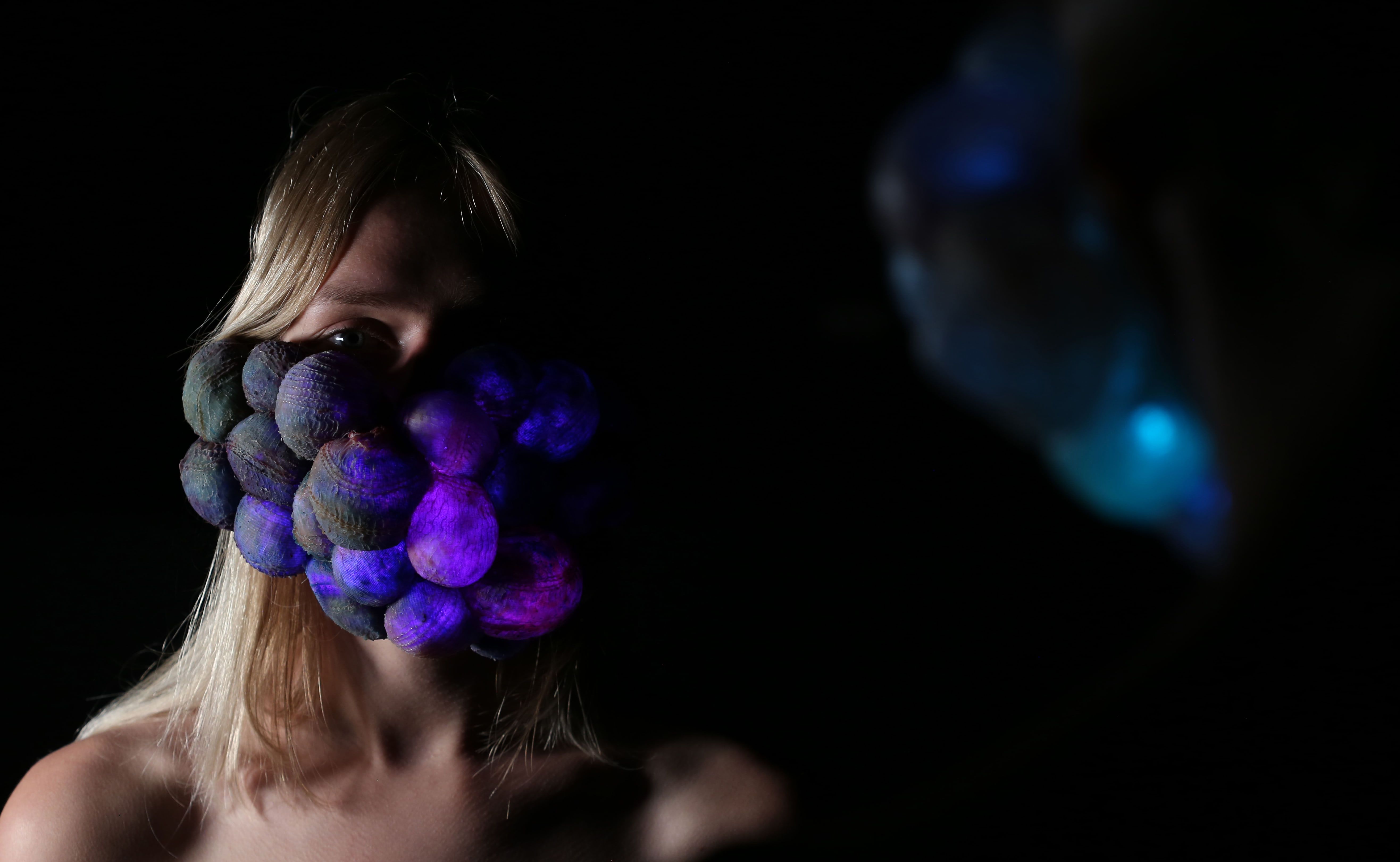
Waarom zouden we deze gegevens delen?
Ons lichaam produceert op elk moment meetbare gegevens, en we zouden deze gegevens kunnen gebruiken om de zorg te verbeteren en nieuwe behandelingen voor ziekten te vinden. Door opkomende moleculaire technologieën, bloeit wetenschappelijke kennis en de vooruitgang in onderzoek naar het menselijk microbioom. Dit zal onvermijdelijk ingrijpende veranderingen teweegbrengen in het begrijpen van onszelf, normaliteit, gezondheid en ziekte, en bijgevolg de medische zorg transformeren, evenals persoonlijke en publieke gezondheid.
De enorme hoeveelheid gegevens die we zouden kunnen genereren door al die autonome micro-organismeprocessen in onze darmen te monitoren, bij elke ademhaling, biedt spannende mogelijkheden voor onderzoekers en artsen - op voorwaarde dat de verzamelde gegevens anoniem blijven en beschermd worden om misbruik ervan te voorkomen. Deze gegevens zouden de gezondheidszorg kunnen verbeteren en nieuwe behandelingen voor ziekten kunnen vinden.
Begrijpen hoe micro-organismen interactie hebben met hun menselijke gastheren zou verschillende aspecten van veel complexe ziekten kunnen verklaren. We kunnen beter inzicht krijgen in stofwisselingsziekten, diabetes en Alzheimer, immuun- en auto-immuunziekten, of zelfs gedragsveranderingen, zoals depressie en angst, of autisme en ADHD bij kinderen.
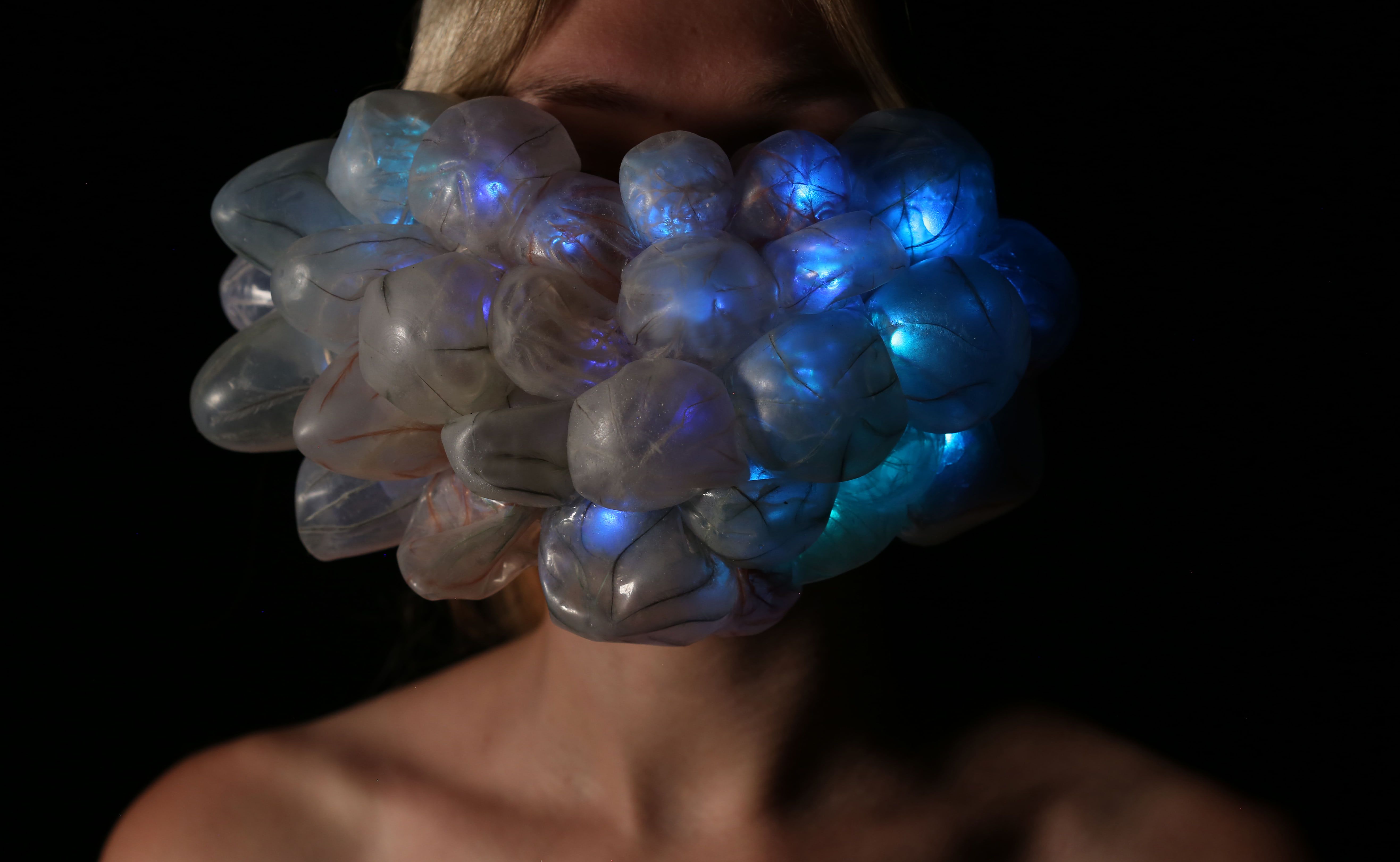
Wat is het droomscenario voor dit ontwerp? Wat is het nachtmerriescenario?
De nachtmerrie zou zijn als microbiële gegevens gebruikt zouden worden om mensen uit te sluiten, te discrimineren of te benadelen. Het zou uiterst problematisch kunnen zijn als verzekeringsmaatschappijen of werkgevers toegang willen hebben tot dit soort gegevens. Bovendien kan de keuze van vrienden en partners beïnvloed worden, aangezien lichamelijk contact de microbiële gemeenschappen op de huid van een mens aanzienlijk beïnvloedt.
Het ideale scenario is om microbiomenonderzoek te gebruiken om de gezondheidszorg te verbeteren en om een collectief begrip te creëren van het belang van microben voor onszelf en ons milieu.
Ik heb de drie Microbial Masks ontworpen op basis van lichaamssystemen die sterk worden beïnvloed door onze microben. Het spijsverteringsstelsel, het ademhalingsstelsel en het immuunsysteem. In de toekomst kunnen wearables in de gezondheidszorg worden gedefinieerd als een uitbreiding van het lichaam, technologie die samensmelt met je lichaam als een extern orgaan. Ik ben geen grote fan van het strakke industriële ontwerp van standaard wearables in de gezondheidszorg van vandaag. De esthetische vertalingen van mijn onderzoek zijn ook visuele voorstellen voor een expressiever en sensueler ontwerp van toekomstige draagbare gezondheidsproducten.
We leven in een microbiële wereld, zonder ons ervan bewust te zijn. Misschien moeten we het menselijk lichaam conceptualiseren als een ecosysteem en de mens als een superorganisme, in plaats van als een enkel individu.
Ervaar Microbial Self als onderdeel van de Dutch Design Week tijdens de DAE Afstudeershow 2019. Van 19 — 27 oktober in de Melkfabriek, Eindhoven.


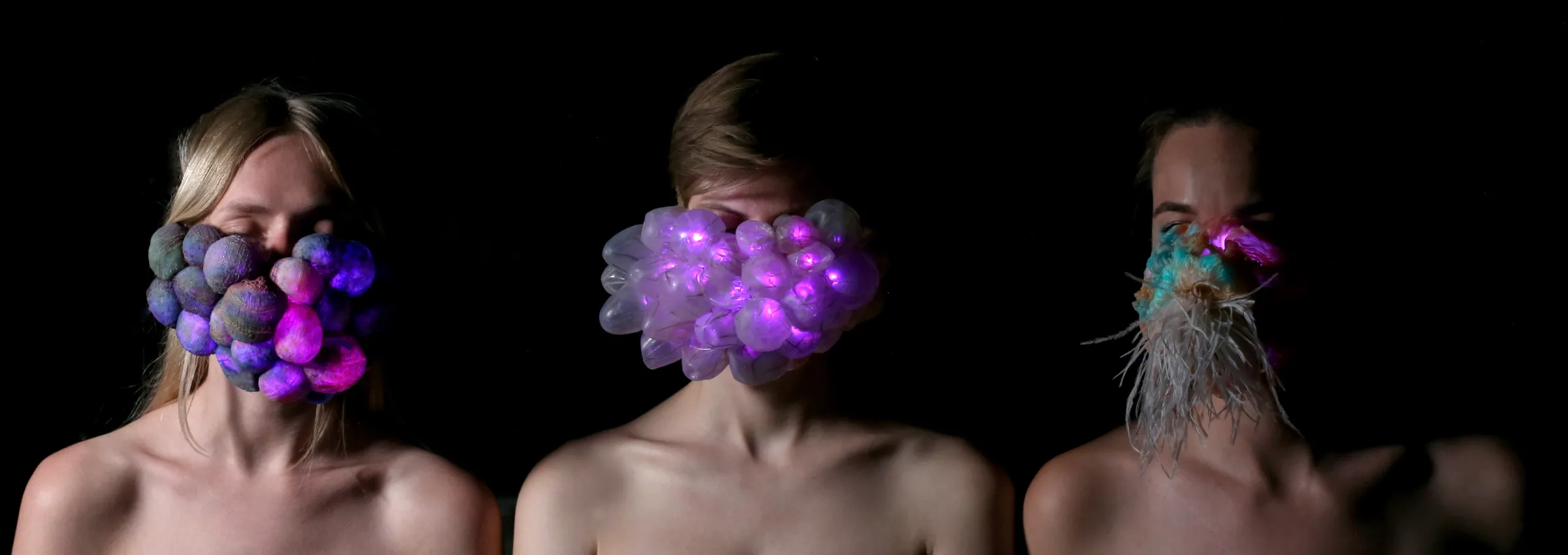
Comments (0)
Share your thoughts and join the technology debate!
No comments yet
Be the first to share your thoughts!